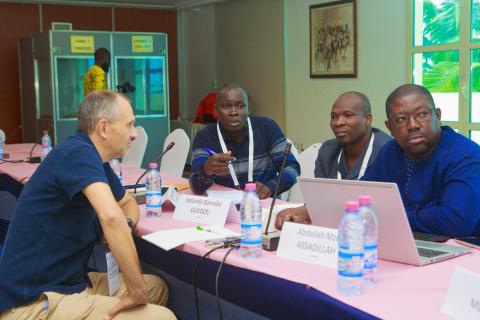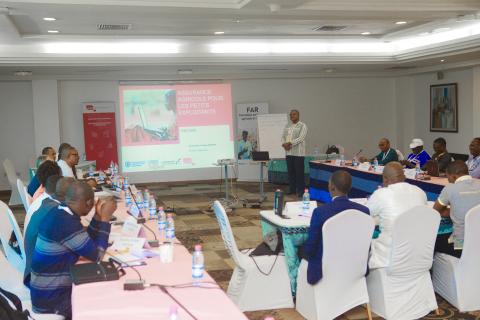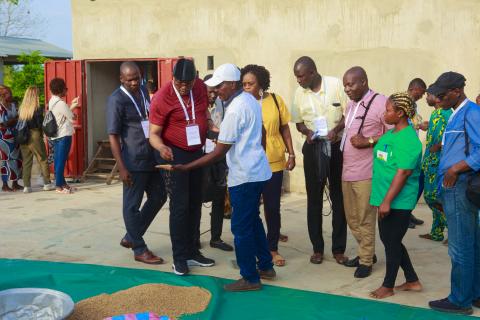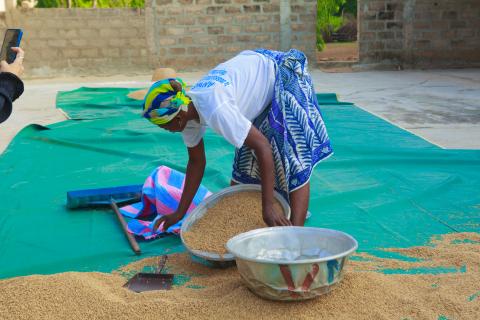
A look back at the 2022 Agricultural and Rural Finance (FAR) training

The fourth edition of the agricultural and rural finance training ended in October 2022 in Cotonou, after which the 40 participants proudly received their certificates. We review the training content and highlights.
The Agricultural and Rural Finance (FAR) training is organised by ADA, the Luxembourgish Ministry of Foreign and European Affairs (MFEA) and the Food and Agriculture Organisation of the United Nations (FAO).
It is aimed at agricultural and rural finance professionals who operate in Africa and want to develop financial and non-financial products for the agricultural sector. It targets executives with decision-making powers within their organisations and individuals in more operational roles who are able to develop these products (directors of operations, loan managers, etc.).
The training in French and English is provided once a year in two parts: an e-learning introductory session over four weeks followed by an in-depth, one-week, in-person session for the most diligent learners.
A look back at an intense and interactive edition
For its fourth edition, the in-person training was held in Cotonou, Benin, from 17 to 22 October in English and French, with the 40 best participants of the e-learning session in April 2022 from 18 African countries. 50% of participants represented financial institutions, while the other half worked for cooperatives, NGOs, public bodies, international organisations, professional associations and impact investors.
The ten courses and the four plenary sessions of the training were provided by experts in agricultural and rural finance, representatives of microfinance institutions, authorities, fintechs and service providers who drew on concrete cases in the field. This combination enabled the participants to enhance their knowledge of agricultural financial product design and financing mechanisms in agricultural value chains. ADA spoke about digital financial services for agricultural financing, risk management and agricultural financing mechanisms.


In addition to the theoretical lessons, participants had an immersive field experience with rice producers at the rice processing units in Grand Popo and Dangbo to see how they managed their organisation and, above all, the financing for their production.



Much more than just training
The FAR training is also and above all a unique opportunity for participants to discuss their respective experiences in various countries with each other and the speakers. This opportunity was one of the strengths once again highlighted by participants at the end of the training, so much so that they took the initiative of launching working groups to continue the discussions. An alumni community of all FAR participants is being developed so that they can continue discussions and take part in additional related activities.
What's next?
Did the training meet expectations? It would seem so. Some participants surveyed at the end of the training are already planning to roll out new agricultural finance products in the coming months and will be drawing from the course on digital finance and index-based insurance. Other participants will take inspiration from the market research techniques taught by the FAO to finance new value chains such as cassava, ginger and corn.
Lessons learned for the next edition
The success and relevance of the FAR training no longer needs to be demonstrated, as shown by the excellent results of the satisfaction questionnaire: 83% were very satisfied with the in-person session, 72% felt the training met their expectations and 89% wouldn't hesitate to recommend it to their peers. The organisation by ADA and the FAO before and during the event was also widely acknowledged.
Some participants recommended that the next editions leave more room for questions during the plenary sessions and extend the duration of certain courses or add others, such as sustainable agriculture, business plans and financial analysis. Meanwhile, the field visit could be longer so that all actors in the same value chain could be asked questions, rather than just those involved in the processing phase.
FAR 2023 in Togo
Bolstered by the success of previous editions, the FAR training will continue in 2023 with an initial e-learning session in the first half of the year and a second in-depth, in-person session ahead of African Microfinance Week (SAM) in October in Lomé, Togo, for the most diligent participants.
Please fill in this form if you'd like to be notified when applications are open: https://bit.ly/3tvmdKv: link to the form